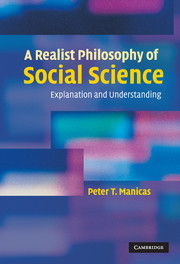Book contents
- Frontmatter
- Contents
- Acknowledgements
- Introduction
- 1 Explanation and understanding
- 2 Theory, experiment and the metaphysics of Laplace
- 3 Explanation and understanding in the social sciences
- 4 Agents and generative social mechanisms
- 5 Social science and history
- 6 Markets as social mechanisms
- Appendix A The limits of multiple regression
- Appendix B Comparison, Mill's methods and narrative
- Appendix C Rational choice theory and historical sociology
- Appendix D The neo-classical model
- References
- Index
6 - Markets as social mechanisms
Published online by Cambridge University Press: 12 November 2009
- Frontmatter
- Contents
- Acknowledgements
- Introduction
- 1 Explanation and understanding
- 2 Theory, experiment and the metaphysics of Laplace
- 3 Explanation and understanding in the social sciences
- 4 Agents and generative social mechanisms
- 5 Social science and history
- 6 Markets as social mechanisms
- Appendix A The limits of multiple regression
- Appendix B Comparison, Mill's methods and narrative
- Appendix C Rational choice theory and historical sociology
- Appendix D The neo-classical model
- References
- Index
Summary
Introduction
There is a long history of theorizing markets as social mechanisms in exactly the sense of the previous chapter. This began at least with Adam Smith's account in The Wealth of Nations (1776). As Smith saw, market outcomes could be explained as the joint product of the actions of persons interacting in society. It is easy enough to see that Smith constructed his mechanism by making assumptions about persons, their beliefs, aims and interests, about what they know, and what they can do. The outcome of their activity was, for example, a market price. The idea was beautifully developed in neo-classical micro-economic theory. This maintained the fundamental assumptions of the “classical” theory, but was able to develop the analysis by generalizing the idea of the “marginal” to cover both production and consumption. All of this could then be articulated in terms of continuous variable mathematical models specifying the relationships between what are considered the key variables. Following the assumptions of the deductivist (D-N) account of theory, the consequences of the assumptions laid down by the theory would then be rigorously deduced.
But there is a paradox here of some importance. On the one hand, by virtue of the sophistication of the models produced by economists, it is very often said that economics is the most advanced or scientific of all the social sciences.
- Type
- Chapter
- Information
- A Realist Philosophy of Social ScienceExplanation and Understanding, pp. 126 - 150Publisher: Cambridge University PressPrint publication year: 2006

